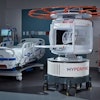Thursday, December 2 | 9:30 a.m.-10:30 a.m. | SSCA10-1 | Room TBA
Automated cardiac MRI measurements correlate better with invasive pulmonary hemodynamics than manual measurements and could also help in predicting mortality, according to this study.Dr. Samer Alabed from the University of Sheffield in the U.K. and colleagues trained a deep- learning algorithm to perform cardiac MRI segmentation using a dataset that included exams provided from multiple centers and acquired on scanners from GE Healthcare and Siemens Healthineers. The cases covered multiple pathologies and a wide spectrum of right-ventricular and left-ventricular disease, according to the authors.
"The model was developed interactively by focusing additional training on failed or suboptimal AI results in what is known as a human-in-the-loop approach," Alabed explained.
After comparing results with invasive right heart catheterization performed on the same day, the researchers found that the fully automated cardiac MR measurements correlated better to the invasive pulmonary hemodynamics than the manual measurements produced by expert cardiac MRI readers as part of their clinical routine.
In other findings, most of the cardiac MR measurements were significant predictors of mortality. Compared with the manual measurements, the AI measurements demonstrated similar univariate hazard ratios with slightly larger effect sizes, according to the Alabed and colleagues.
"AI-powered fully automated biventricular measurements further improve the utility of [cardiac MR] in a clinical setting," the authors wrote.
You can get the rest of the details by sitting in on this Thursday presentation.



.fFmgij6Hin.png?auto=compress%2Cformat&fit=crop&h=100&q=70&w=100)





.fFmgij6Hin.png?auto=compress%2Cformat&fit=crop&h=167&q=70&w=250)











